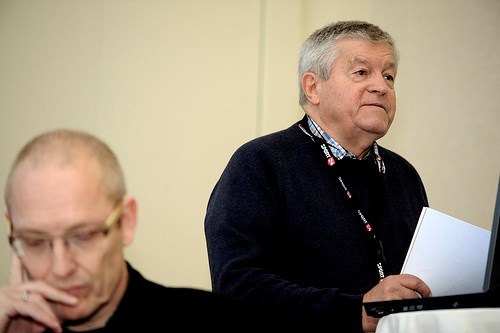West Germany considered pumping swimmers full of air

Gerhard Treutlein, professor at Heidelberg University talks at Play the Game 2013. Photo: Play the Game / Thomas Søndergaard
29.10.2013
By Kirsten SparreAt that time, it was seriously considered to pump air into the intestines of swimmers through their anuses to improve their position in the water. Specialists, coaches, and sports officials fully supported the idea.
Time did not allow Treutlein to go into explaining whether the idea was actually carried out, but his presentation at the Play the Game conference outlined the thinking about doping and athletes in West Germany in the years immediately following the IOC's recognition of East Germany as an independent state.
The fight for medals between the two Germanies was on, and doping was completely accepted as a means to obtaining that goal. In his presentation, Treutlein quoted what a government representative, Dr. Gerhard Gross, said at the inauguration of the Institute of Sports Medicine at Freiburg University in 1976:
"I know your position: You say that the use of substances that stimulate performances is acceptable if there is no danger to health. The interior minister basically is sharing your position. We cannot deny that athletes in other countries have been successfully tested as an aid to training and competitions without any danger to the health of athletes. This assessment is inevitable if we want to stay in the race among the world's best in the world of sport. And we want to."
The rights of athletes to say yes or no to doping did not appear to be an important issue, and Treutlein is concerned that this might still be the case.
"If doping was driven by East-West competition, it would have ended after the unification but the caravan moves on. The chiefs of the caravan: Doctors, politicans, media and the public all expect medals. So what is our vision for competition sports and the destiny of athletes now?" he asked.
The WADA code must incorporate diversity
In his presentation, Herman Ram, Head of Anti-Doping Authorities Netherlands, had a different approach to the rights of athletes. Whilst he recognises the need for a global anti-doping regime, he also wants to protect athletes from a model with a punishment system where one-size-fits-all.
"I support the WADA programme completely. The WADA code is the main harmonisation tool and it must be followed. However, the next question is how to incorporate diversity into the code," he said.
In his presentation, he demonstrated how different countries have very different histories, cultures, political approaches and geographical challenges that all impact on the way the countries act on anti-doping issues.
"In order to be effective in what we do, we need the support of publics, politicians and athletes, and to gain and deserve that support, the goals, rules and criteria must be understandable, recognisable and acceptable within a certain community and society," said Ram.
He also stressed that in order to gain accept from athletes, anti-doping goals, rules and criteria must lead to a proportionate outcomes in individual cases.
"The rules must have room to take the individual personality into account. We must strive to find the right balance between harmony and diversity. That is the main challenge in the years to come," he said.





